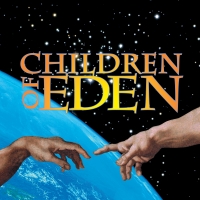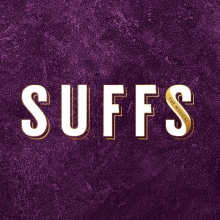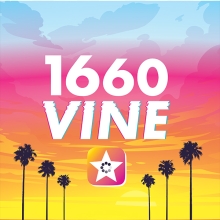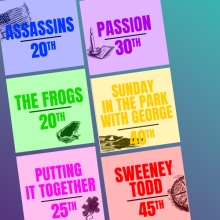
Full Synopsis
Act One
The story of Adam and Eve, Cain, and Abel
The musical begins in darkness. As the chorus of Storytellers describes the beginning of the world, when Father created the heavens, candles are lit around the stage. Father comes on and declares, "Let there be light." Father builds the world based on his dream ("Let There Be"). He creates Adam and Eve and gives them the Garden of Eden in which to live. Eden is a perfect place.
Eve wants to know about the glowing tree on top of the hill. Father tells them that it is the tree of knowledge and that they must never eat its fruit. Eve questions why Father put the tree there if it's not good. Father tells her to have faith in his reasons. To divert their attention away from the tree, Father asks Adam and Eve to help him name all of the animals. With the help of the Storytellers pretending to be animals, Adam, Eve and Father name the animals ("The Naming"). When that is done, Adam and Eve go to sleep as Father sings them a lullaby ("Grateful Children"). Father reflects on how well his universe turned out ("Father's Day"). Meanwhile, in the night, Adam and Eve kiss and realize that they are not brother and sister.
One day, Eve goes up to the tree of knowledge, and it enchants her. When she tries to show the tree to Adam, he is not interested and goes back to naming his bugs. However, Eve remains curious about the world beyond ("The Spark of Creation") A Snake comes up to Eve and asks her questions. Eve does not know the answers, but she is intrigued. The Snake convinces Eve to pursue knowledge and eat the fruit of the tree ("In Pursuit of Excellence"). Eve eats the fruit and tricks Adam into eating it by turning it into juice. When Adam realizes that they have eaten from the tree of knowledge, he and Eve hide from Father. Father calls to them, but Adam is ashamed. Unashamed, Eve tells Father that she understands her own potential. Father orders Eve to leave the garden and tells Adam that he will make him a better wife. Adam chooses to stay with Eve instead of staying in Eden ("A World without You"). Father exiles Adam and Eve to the wilderness ("The Expulsion").
Time passes as the Storytellers describe Adam and Eve's desolate new environment ("The Wasteland"). Eve gives birth to two sons, Cain and Abel. Adam prays to Father to be let them back into paradise. As the boys grow up, Cain becomes more curious about the world while Abel remains obedient to Adam. Eve worries that she has passed her hunger for knowledge onto Cain. Cain convinces Abel to leave their home to seek their own destinies out in the world ("Lost in the Wilderness"). Father comes upon Cain and Abel and tells them that he has placed his hope in them. Cain declares that he will find his own destiny without Father's help and storms off. Before he leaves, Father makes Abel promise that he won't tell Adam about the meeting and tells Abel that he is the only hope for the future. When Adam learns that Cain is gone, he curses him, but also remembers Cain and Abel playing childhood games ("Close to Home").
Cain returns and describes what he has found: "A Ring Of Stones," which means that Adam's family members are not the only people in the world. Adam thinks that the other people are barbarians and orders Cain never to speak of them again. However, Cain, wanting to be a part of a larger family, tries to leave, but Adam blocks his way. Abel tries to restrain Cain, but Cain kills him with a rock. Shouting to Adam that he should be dead, Cain runs off as Abel dies in Eve's arms. As Cain is running, Father appears before him and asks where his brother is. Cain asks if he is his brother's keeper. Father marks Cain's forehead and curses him and all of his children ("The Mark of Cain").
Eve comes out. She is now an old woman. Adam has died. She introduces her third son, Seth, who is married with children. Father returns to Eve and tells her that Cain is alive. Eve tries to ask more questions, but Father disappears. Eve gathers the grandchildren together and tells them that this is her last harvest. Eve and the company dream of the day when they will return to their true home, Paradise ("Children of Eden").
Act Two
The story of Noah and the flood
The act begins in light, a thousand years after Act One. The Storytellers come on and trace the line of Adam to Noah and his three sons: Shem, Ham and Japheth ("Generations"). Father wants Noah to finish building the ark quickly, so that he can flood the world and destroy the line of Cain.
Meanwhile, Noah has other worries. His youngest son, Japheth, is not married. When Japheth announces that he will present his bride at dinner, Noah and the family eagerly prepare for the feast ("A Piece of Eight"). At the dinner, Japheth announces that he wishes to marry Yonah, the servant girl who bears the mark of Cain. Noah declares that it will not be possible because Father would disapprove. Japheth storms off just as animals start appearing on their way to the ark. Noah and his family try to organize the animals, but more and more keep boarding ("The Return of the Animals"). After everyone is on board the ark, Noah sees Yonah standing alone and apologizes that he can not take her with him. Yonah is left alone as the rain starts to fall and she prepares to go her own way ("Stranger to the Rain"). Japheth finds Yonah, states that Father is wrong and hides Yonah in the ark. They declare their love for one another ("In Whatever Time We Have"). As Japheth pulls Yonah into the ark, "The Flood" begins as Father sends down more rain.
The rain continues for forty days and forty nights. With food running out, Noah and his family begin having cabin fever as they anxiously wait for the rain to stop ("What Is He Waiting For?"). Yonah, worried that she is the reason that the rains have not stopped, sends a dove to find land ("Sailor of the Skies"). Shem and Ham find Yonah on the ark. Ham fetches Noah, who is very displeased with the situation. Shem tries to throw Yonah overboard. Japheth runs on to stop him, but Noah blocks his way and pushes him away. A fight ensues. Japheth almost kills Ham, but Yonah stands in his way. Japheth backs off. Mama Noah speaks up, and the children leave her alone with Noah. Noah reveals to her that Father no longer speaks to him. Mama Noah tells him that he must be the Father now. Alone, Noah reflects on the difficulty of being a father to a son who makes his own choices ("The Hardest Part of Love"). Hearing Noah, Father realizes that he has to let humanity choose its own destiny.
Noah marries Japheth to Yonah. The dove returns with an olive branch, and the stars come out. Mama Noah celebrates their new hope with the Storytellers ("Ain't It Good"). The sun shines, and the ark lands at Mount Ararat. The three sons decide to travel in different directions, each with a different animal. Japheth announces that he will search for Eden. Noah says goodbye to his children. Father promises not to destroy the earth again and to let humanity take responsibility for its own fate ("In the Beginning").
Show History
Inspiration
The musical is based on the the book of Genesis, which has confounded and mystified artists for thousands of years. Composer and lyricist, Stephen Schwartz, was not immune to its pull; Schwartz "was intrigued with doing a show about second chances and learning from past mistakes."
Schwartz had the idea for Children of Eden when he was approached about writing a show based on the book of Genesis, spanning creation to the end of the Flood. In the summer of 1986, Schwartz wrote an oratorio of eleven songs, entitled Family Tree for a Youth Sing Praise program in St. Louis. Director/librettist, John Caird, came on board, and Children of Eden was born.
Productions
Children of Eden was initially being developed in workshop at the Royal Shakespeare Company. Composer, Stephen Schwartz, had gone to London at the request of director/librettist, John Caird, but, while working on the show, Prime Minister Margaret Thatcher slashed the theatre company's budget, forcing the cancellation of their season and the elimination of all developmental funding. A decision was eventually made to open the show directly in the West End, where it premiered on January 8, 1991. Later, Schwartz admitted that the production was "like staging a first draft... we just weren't ready for a commercial production." With mixed reviews and a decline in tourism because of the Gulf War, the production shuttered after only three months. It closed on April 6, 1991.
Following the closing, Schwartz began to tweak and rework the musical through various regional productions across the U.S. In 1997, New Jersey's Paper Mill Playhouse mounted a reworked version to much success. The cast featured Stephanie Mills and Adrian Zmed, and spawned a two-disc cast recording. In December of 2003, Children of Eden arrived in New York City as a one-night-only, all-star benefit concert.
Children of Eden was also featured in the Festival of New Musicals sponsored by the National Alliance for Musical Theatre. NAMT has nurtured the creation, development, production and presentation of new musicals since 1985.
Trivia
- The acclaimed Paper Mill Playhouse production of Children of Eden used several children in the chorus, who played many of the animals by means of puppetry, costumes and masks.
Critical Reaction
"An expansive, ambitious musical – a rich score [with] pageantry and sweep."
– L.A. Times
"An affectionate show with a large heart – Stylish, entertaining and often moving."
– Roanoke Times
Connect
Billing
- Book by
- Music and Lyrics by
Based on a concept by Charles Lisanby
Requirements
|
Book by
|
Music and Lyrics by
|
|
JOHN CAIRD
(50%)
|
STEPHEN SCHWARTZ
(50%)
|
Video Warning
In accordance with the Performance License, you MUST include the following warning in all programs and in a pre-show announcement:ANY VIDEO AND/OR AUDIO RECORDING OF THIS PRODUCTION IS STRICTLY PROHIBITED.
Included Materials
| Item | Quantity Included |
|---|---|
| LIBRETTO/VOCAL BOOK | 25 |
| PIANO CONDUCTOR'S SCORE ACT 1 | 2 |
| PIANO CONDUCTOR'S SCORE ACT 2 | 2 |
| STUDY GUIDE | 1 |
Production Resources
| Resource |
|---|
| FULL SCORE VOL. 1 OF 4 |
| FULL SCORE VOL. 2 OF 4 |
| FULL SCORE VOL. 3 OF 4 |
| FULL SCORE VOL. 4 OF 4 |
| HOW DOES THE SHOW GO ON-10/CS |
| HOW DOES THE SHOW GO ON? |
| KEYBOARD PATCH SOLUTIONS |
| KEYBOARDTEK |
| LOGO PACK |
| LOGO PACK DIGITAL |
| LOGO TEES SIX-PACK ADULT LARGE |
| LOGO TEES SIX-PACK ADULT MEDIUM |
| LOGO TEES SIX-PACK ADULT SMALL |
| LOGO TEES SIX-PACK ADULT X-LARGE |
| LOGO TEES SIX-PACK ADULT XX-LARGE |
| LOGO TEES SIX-PACK CHILD LARGE |
| LOGO TEES SIX-PACK CHILD MEDIUM |
| LOGO TEES SIX-PACK CHILD SMALL |
| OCTAVO EDITION |
| PERFORMANCE ACCOMPANIMENT RECORDING |
| PRODUCTIONPRO-DIGITAL SCRIPT/SCORE |
| REFERENCE RECORDING |
| REHEARSAL ACCOMPANIMENT RECORDING |
| REHEARSCORE APP |
| SCENIC PROJECTIONS |
| SCENIC PROJECTIONS PRO |
| STAGE MANAGER SCRIPT |
| STAGE WRITE APPLICATION |
| STREAMING LICENSE |
| TRANSPOSITIONS-ON-DEMAND |
| VIRTUAL STAGE MANAGER |
STANDARD ORCHESTRATION
| Instrumentation | Doubling |
|---|---|
| BASS | |
| CELLO | |
| DRUMS | ANKLUNG , CHINESE CYMBAL , DUMBEK , FINGER CYMBAL , KIT , MARK TREE , SHAKER , SUSPENDED CYMBAL , TAM-TAM , TRIANGLE , WOOD BLOCK |
| ERRATA LIST | |
| GUITAR | ACOUSTIC GUITAR , ELECTRIC GUITAR , MANDOLIN |
| GUITAR 2 | ACOUSTIC GUITAR , ELECTRIC GUITAR |
| HORN | |
| KEYBOARD 1 | |
| KEYBOARD 2 | |
| KEYBOARD 3 | |
| PERCUSSION | |
| REED 1 | ALTO SAXOPHONE , CLARINET , FLUTE , PICCOLO |
| REED 2 | BASS CLARINET , CLARINET , TENOR SAXOPHONE |
| REED 3 | CLARINET , ENGLISH HORN , OBOE , TENOR SAXOPHONE |




